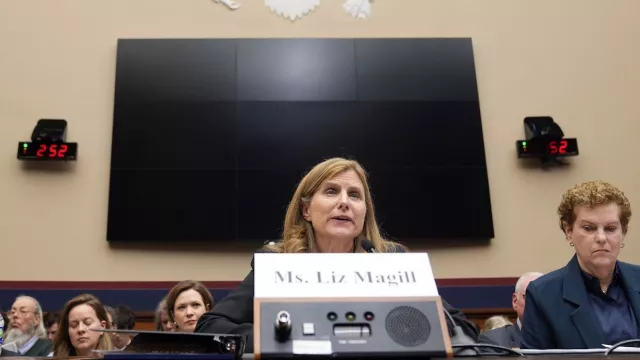Table of Contents
Penn faculty call for ‘New Constitution’ recommitting university to free speech principles

Sophia Zengierski / Shutterstock.com
“Ben on The Bench” sculpture of Ben Franklin reading the Pennsylvania Gazette on the University of Pennsylvania campus.
Faculty members at the University of Pennsylvania are concerned that free expression and viewpoint diversity may disappear completely from their university.
After a tense congressional hearing in which then-President Liz Magill said the university would not punish many forms of constitutionally protected speech — including anti-Semitic speech — Magill backtracked the next day via a video apology in which she signaled her willingness to abandon constitutional standards for free speech. Shortly afterward, she resigned.
In the wake of this shakeup, the future of free speech at Penn is far from certain.

Penn President Liz Magill signals profoundly misguided willingness to abandon free expression
News
University of Pennsylvania President Liz Magill signaled that one of our nation's most prestigious institutions is willing to abandon its commitment to freedom of expression.
At The Wharton School, board members propose restricting “hate speech, whether veiled or explicit, that incites violence.” This suggested restriction conflates hate speech and incitement, which are drastically different forms of expression — one protected, one unprotected. Penn must stick to constitutional standards as a guide for what speech should be protected on campus and what may be justly punished, but it’s clear that some members of the Penn community would like to see the school discard that precedent and advance the cause of censorship.
Others, however, would like to see the school revive its commitment to free speech. In that spirit, some faculty members drafted a “New Constitution for the University of Pennsylvania,” a vision for the university which calls Penn to recommit itself to intellectual diversity, institutional neutrality, and open discourse. The authors of this “Constitution” invite concerned individuals to sign the letter to stand with them in support of these values at Penn and in higher education at large.
If Penn adopts the Wharton board’s suggestion, it will mean rolling back decades of progress in free expression. Though the current requests for speech code implementation are intended to protect Jewish students, they are doomed to fail — and even backfire — because speech codes untethered from constitutional standards are always open to interpretation and arbitrary application.
For instance, during the infamous Penn “water buffalo” incident, Eden Jacobowitz, an Israeli-born Jewish student, faced sanction for shouting, “Shut up, you water buffalo,” at a group of rowdy sorority students outside his dorm room window. The sorority students were black, and administrators argued that “water buffalo” was a racial epithet. Jacobowitz, who speaks Hebrew, explained that “water buffalo” is a rough English translation of “behema,” a Hebrew slang term for a loud, rowdy person. Eventually, the charges were dropped and Penn went on to reform all of its speech codes, becoming one of the first universities to earn FIRE’s highest, “green light” rating for maintaining speech-protective policies.
One thing is certain: Penn cannot censor its way into a culture of free expression.
Unfortunately, things didn’t stay that way. Penn’s current policies leave a great deal of room for improvement. Just this year, Penn placed near the bottom of FIRE’s College Free Speech Rankings, second only to Harvard.
As the faculty members’ proposed new constitution shows, faculty are not content to sit back and watch Penn’s decline. Their document demonstrates a strong commitment to intellectual freedom and civil discourse at Penn, and it outlines why these values matter. It states that “the free exchange of ideas” is necessary for Penn to complete its mission of “the pursuit, enhancement, and dissemination of knowledge.”
The faculty constitution also suggests that Penn encourage free and open expression by maintaining institutional neutrality on social and political issues. Paraphrasing the famous “Kalven Report,” an institutional commitment recently endorsed by FIRE, the faculty write, “The university serves as the hosting entity for [] critics, but it does not act as the critic itself.”
Students and faculty should be free to comment on political and social issues without falling afoul of the university’s enforced orthodoxy. As the faculty letter concludes:
Official commentary on societal and political events inevitably alienates individuals within the community who hold differing opinions from the institutional perspective or who, in their research efforts, wish to reexamine common orthodoxies.
Penn would do well to adopt a universally applied institutional neutrality policy to avoid becoming embroiled in the kind of controversy they are dealing with today.
One thing is certain: Penn cannot censor its way into a culture of free expression. Join us and the Penn faculty by adding your signature to “A Vision for a New Future of the University of Pennsylvania” and reminding the Penn community that more viewpoints, more tough conversations, and, most importantly, more speech, are the answer to its troubles. Not more censorship.
Signatories don’t need to be Penn faculty members, alumni, or otherwise associated with the university in any way to sign — so send it to all of your pro-free speech friends!
Recent Articles
FIRE’s award-winning Newsdesk covers the free speech news you need to stay informed.

Columbia University, Mahmoud Khalil, DEI, law firms, and more
Podcast
We explore how censorship is impacting institutions -- from universities to law firms to the Maine House of Representatives. Timestamps: 00:00 Intro 01:40 Federal government cuts Columbia's funding 16:57 Updates on the Mahmoud Khalil case...

Defending free speech: FIRE and Substack partner to protect writers in America

Brown University targets student journalist for sending DOGE-like emails


